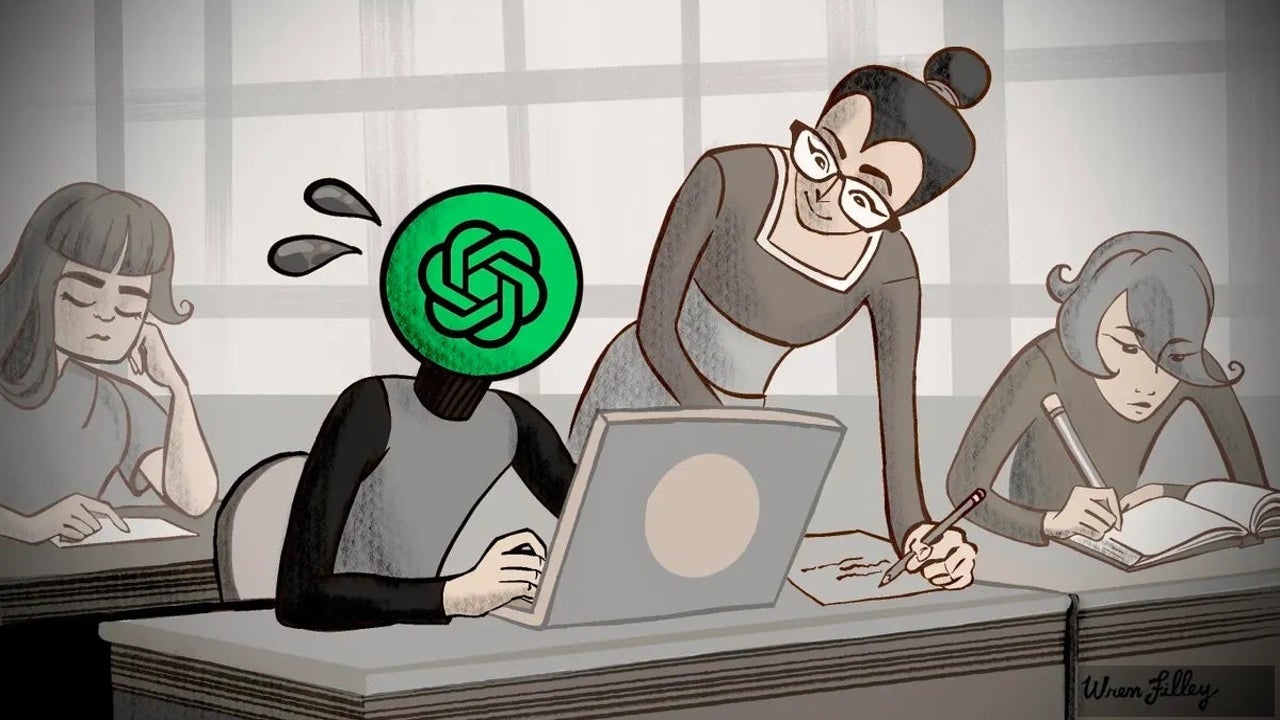How to know if your students are using ChatGPT and other AI systems in their assignments
Teachers around the world fear being deceived by their students when assigning homework and tasks. These tips will help you discover who's cheating

- September 2, 2024
- Updated: July 1, 2025 at 11:01 PM

Cheating is an activity as old as the sun itself. Since the world exists, students have wanted to take advantage of their classmates’ knowledge for their own benefit. But in 2024, we don’t use our classmates; we use AI as “support” to find help.

Subscribe to the Softonic newsletter and get the latest in tech, gaming entertainment and deals right in your inbox.
Subscribe (it's FREE) ►The attraction is understandable. The dubious writing services where a student has to spend a fortune for a person – whose qualifications you don’t know – to write 1,200 words about the fall of the Roman Empire have disappeared. An artificial intelligence writing tool can do it for free in 30 seconds and from your mobile, tablet, or computer.
A professor of strategic communication explains that he often encounters students who use AI tools such as ChatGPT, Grammarly, and EssayGenius.
It clarifies that it is generally easy to know when a student has used one of these tools to write their entire work. The telltale signs include ambiguous language and the AI’s annoying tendency to generate text that is not the essence of the task.
How to engage students using ChatGPT in class
For example, a student can use ChatGPT to write a brief response to an assignment by copying and pasting the teacher’s question into the tool.
The professor explains that one of the most noticeable warning signs is the frequency with which the key terms of the question are mentioned in the work. In other words, if a work asks about the Roman Empire, an AI tool will repeatedly write the Roman Empire throughout the work, something that a person would never do.
Students generally do not repeat the key terms of the question in their work in this way, and the results resemble an internet SEO strategy more than a unique essay intended to demonstrate an understanding of the topic.
But can teachers use AI tools to detect students who use them? I devised some ways to be smarter at detecting artificial intelligence in tasks.
This is what Professor Rachel Kane says in her article on CNET:
- Understand AI capabilities: Currently, there are AI tools in the market that can scan a task and its grading criteria to provide a complete, cited, and fully written work in a matter of moments. Familiarizing yourself with these tools is the first step in combating integrity violations caused by AI.
- Do as the cheaters do: Before the semester begins, copy and paste all your assignments into a tool like ChatGPT and ask it to do the work for you. When you have an example of the results it provides explicitly in response to your assignments, you will be better prepared to detect robot-written answers. You can also use a tool specifically designed to detect artificial writing in papers.
- Get a real writing sample: At the beginning of the semester, ask your students to send you a simple, fun, and personal text. Once you have a real writing style sample from the student, you can later use it to have an AI tool review that sample by comparing it to what you suspect might be an AI-written work.
- Ask for a rewrite: If you suspect a student is using AI to cheat on their assignment, take the submitted work and ask an AI tool to rewrite it. In most cases, I have encountered an AI tool that will rewrite its own work in the laziest way possible, substituting synonyms instead of changing substantial elements of the original work.
With all of this, we would already have more than enough tools to combat cheaters and reward good students. Good luck, teachers, you’re going to need it.
Journalist specialized in technology, entertainment and video games. Writing about what I'm passionate about (gadgets, games and movies) allows me to stay sane and wake up with a smile on my face when the alarm clock goes off. PS: this is not true 100% of the time.
Latest from Chema Carvajal Sarabia
You may also like
 News
NewsIdris Elba premieres the second season of one of the most watched series on AppleTV
Read more
 News
NewsNobuo Uematsu confirms that the favorite soundtrack among those he has composed is from your favorite Final Fantasy
Read more
 News
NewsThe creator of Yellowstone sees the end point of his thriller with a final fifth season
Read more
 News
NewsThose in charge of the Deus Ex franchise are psychopaths, according to the voice of their main character
Read more
 News
NewsThere are only 30 units of this edition of Cyberpunk 2077, and it is the most sought after by collectors around the world
Read more
 News
NewsThe director of It presents his new action and horror movie with one of the lead actresses from Deadpool 2
Read more